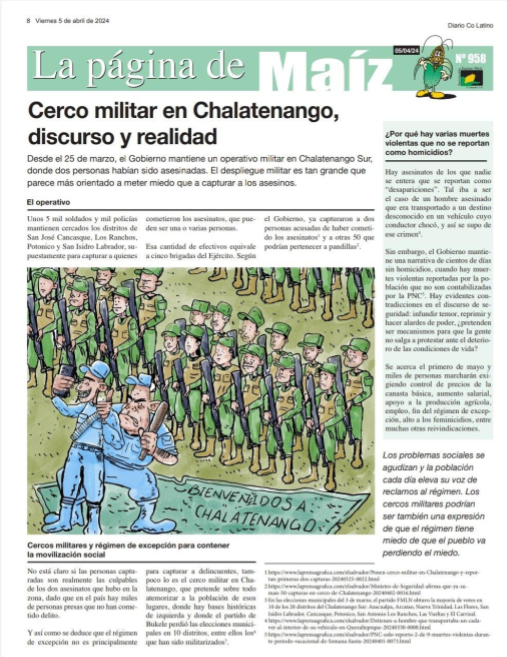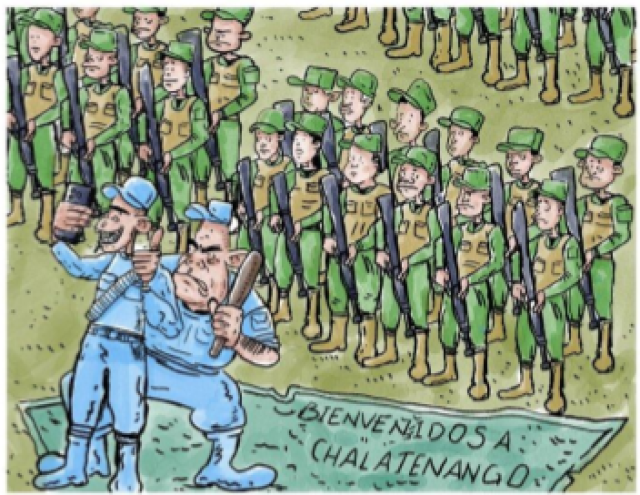Military Siege Descends on Historic Leftist Communities
As the two-year anniversary of the suspension of civil liberties under the country’s State of Exception approached, the Nayib Bukele government deployed thousands of soldiers and police officers to South Chalatenango. The newly-created municipality is a historic bastion of the leftist Farabundo Marti National Liberation Front (FMLN), which came out on top in half of the municipality’s districts in the recent elections. Residents also say gangs did not have a presence in the districts currently under military siege.
On a recent panel hosted by CISPES and Global Exchange, journalist John Gibler shared his recent experience talking with relatives of four innocent young men arrested under the State of Exception in the South Chalatenango district of Guarjila, which still faces military occupation. The town’s historic Jon Cortina Museum, a symbol of organized resistance, was occupied by soldiers, and the director of a community development organization has been detained since January 14, accused of “illicit association.”
In an April 4 interview with the University of Central America radio station, leaders of the Popular Resistance and Rebellion Bloc spoke about the Bukele government’s tactic of using military sieges: “Who are these military sieges directed towards? According to the data, they are … principally directed towards people who live in communities that have historically been organized in order to defend their rights. The effects of these military sieges are psychological. They affect people who lived through the war and are now living through these sieges again.”
For a deeper dive into the military siege in Chalatenango, see the below translation of the weekly bulletin created by Equipo Maiz, a popular education organization in El Salvador.
April 5, 2024
The Military Siege in Chalatenango:
Rhetoric and Reality
The government has maintained a military operation in South Chalatenango since March 25, where two people had been murdered. The military deployment is so big that it appears that the aim is more to instill fear in the population than to capture those responsible for the murders.
The Operation
5,000 soldiers and 1,000 police officers have surrounded the districts of San Jose Cancasque, Los Ranchos, Potonico, and San Isidro Labrador, supposedly to capture the person or people who committed the murders.
That amount of personnel is equivalent to five army brigades. According to the government, they have already detained two people accused of having committed the murders and 50 other possible gang members.
Military Sieges and a State of Exception to Suppress Social Movement Mobilizing
It is unclear whether or not the people who were arrested were responsible for the two murders that took place in the region, given that there are thousands of incarcerated people in the country who haven’t committed any crime. And just as we know that the State of Exception’s primary aim is not to arrest criminals, we can deduce that the same is true of the military siege in Chalatenango. More than anything else, its aim is to terrorize the local populations of historic leftist communities, where Bukele’s party lost ten districts in the municipal elections; some of which are among those that have been militarized.
Why have there been numerous violent deaths that are not being reported as homicides?
There are murders that no one finds out about that are reported as “disappearances.” That would have been the case for a man who was murdered and his body was being taken to an unknown location in a vehicle whose driver crashed. That was the only way the crime was revealed.
The government maintains the narrative that there have been hundreds of days without any homicides, yet people report violent deaths which are not counted by the National Civil Police (PNC). There are obvious contradictions in the government’s rhetoric around security; are instilling fear and repression and broadcasting displays of power intended to prevent people from protesting against the decline in living conditions?
There are clear contradictions in the security discourse: instilling fear, repression and the flaunting of power are intended to be mechanisms to prevent people from going out to protest against the deterioration of living conditions?
May 1st is approaching and thousands of people will march to demand controls on the price of basic foods, a raise in the minimum wage, support for agricultural production, an end to the State of Exception, and ending femicides, among many other demands.
Social issues are getting worse and the public is raising its voice every day to make demands of the regime. The military sieges could also be an expression that the regime is worried that the people are losing their fear.



 "I am a CISPES supporter because continuing to fight for social justice and a more people-centered country means continuing the dream and sacrifice of thousands of my fellow Salvadorans who died for that vision.” - Padre Carlos, New York City
"I am a CISPES supporter because continuing to fight for social justice and a more people-centered country means continuing the dream and sacrifice of thousands of my fellow Salvadorans who died for that vision.” - Padre Carlos, New York City

